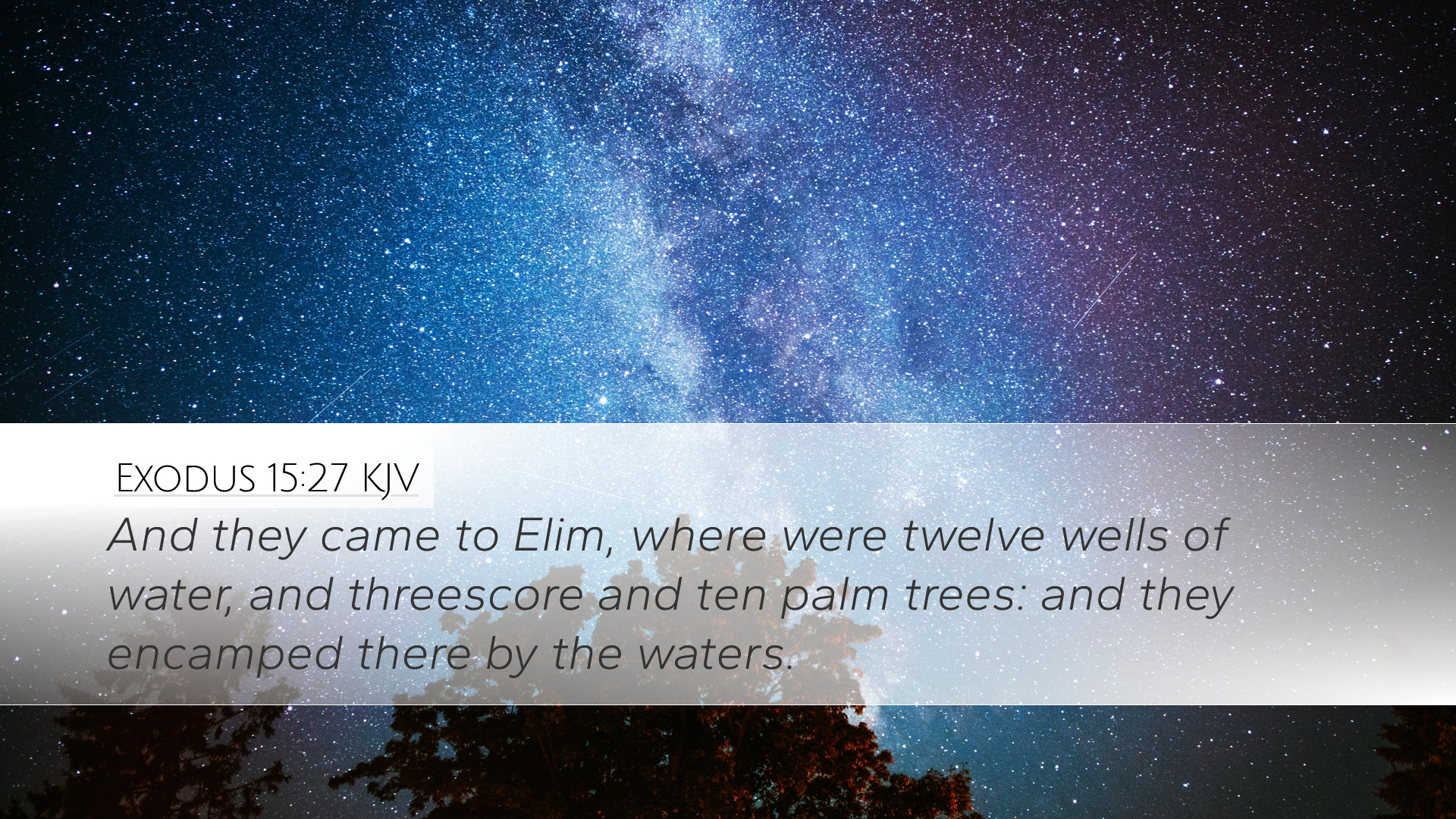Exodus 15:27 Commentary
Verse: "Then they came to Elim, where there were twelve springs of water and seventy palm trees; and they encamped there by the waters." (Exodus 15:27, ESV)
Introduction
The journey of the Israelites after their exodus from Egypt showcases God’s providential care and the dynamics of faith amidst trials. Exodus 15:27 marks a pivotal moment in their trek towards the Promised Land. This verse serves both as a geographical note and a theological lesson, revealing God’s sustenance and the spiritual oasis He provides in times of need.
Historical Context
After the miraculous crossing of the Red Sea and the defeat of the Egyptian army, the Israelites faced a harsh wilderness. It is in this context that Elim is introduced. This location is significant, not just as a physical destination, but as a symbol of God’s provision amid adversity.
Insights from Commentaries
Matthew Henry
Matthew Henry emphasizes the mercy of God in the provision of Elim. He notes that "this was a most welcome refreshment" for the weary Israelites. The twelve springs can be seen as a representation of the twelve tribes of Israel, suggesting that God’s provision encompasses His entire covenant community. The presence of the seventy palm trees denotes abundance and rest, indicating a place of refuge amidst the wilderness. Henry concludes that such divine refreshment exemplifies God’s commitment to His people even when their faith falters.
Albert Barnes
Albert Barnes provides a detailed exploration of the geographical and symbolic importance of Elim. He points out that Elim, with its twelve springs and seventy palm trees, symbolizes both spiritual and physical sustenance. Barnes further interprets the number of springs as a direct provision from God for His people, reiterating that "in the wilderness, He does not allow His people to languish." The emphasis on palm trees also signifies a place of shade and rest, vital as the Israelites journeyed through a harsh desert environment.
Adam Clarke
Adam Clarke offers a rich theological reflection on the significance of Elim. He states that Elim represents a place of rest granted by God, where the people could reflect on their journey thus far. Clarke highlights that the springs of water symbolize spiritual refreshment, suggesting that as they quenched their physical thirst, they also needed to seek spiritual nourishment. He encourages readers to reflect on the importance of resting in God’s provision and acknowledges the human tendency to forget God’s faithfulness during trials.
Spiritual Lessons and Applications
The journey to Elim teaches significant spiritual lessons:
- God’s Provision: Elim serves as a reminder that God provides for His people in ways that may seem unexpected. The springs of water symbolize His ability to meet our needs in difficult times.
- Community and Unity: The twelve springs reflect the unity of the tribes of Israel, serving as a metaphor for the body of Christ today, where every member is crucial and cared for.
- Temporality of Trials: Just as the Israelites moved from bitter waters to a refreshing oasis, believers are reminded that trials are temporary and that God always has a plan for restoration.
- Spiritual Refreshment: Like the physical water at Elim, spiritual refreshment is found in communion with God through prayer, the Word, and community.
- Importance of Rest: Reflecting on Clarke’s insights, there is a divine mandate to rest and recuperate both physically and spiritually, allowing God to rejuvenate our weary souls.
Conclusion
Exodus 15:27 not only chronicles a historical moment for the Israelites but also serves as a profound reminder of God's enduring faithfulness. Through the fresh waters and abundant trees at Elim, believers today are encouraged to seek out God’s provision and rest in His promises. The account demands a reflective approach toward our own journeys and the oases of grace God has placed along the way. For pastors, students, theologians, and Bible scholars, this verse encapsulates a theological richness worthy of continual exploration and meditation.


